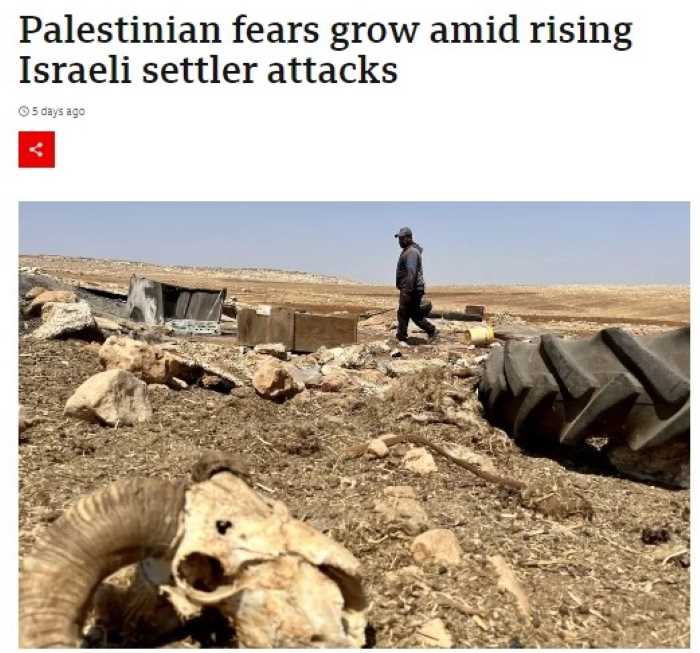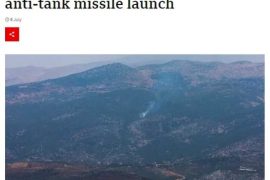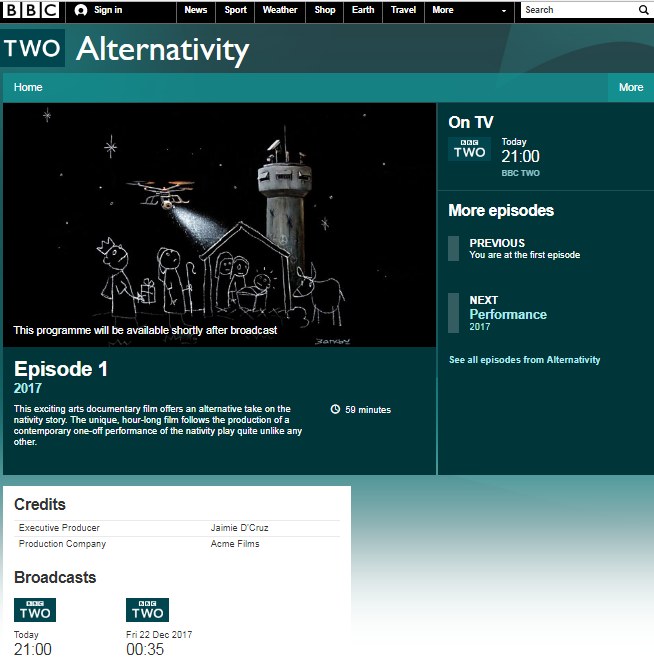It is not difficult to determine when a report from the BBC’s Jerusalem bureau is part of a wider campaign on a particular topic rather than straightforward coverage of news. Such reports usually get more cross-platform exposure than regular news items and quite often, perusal of other media outlets will turn up similar reports from around the same time based on the same sources, which are often political NGOs.
On the afternoon of August 28th, the BBC News website published a report by Yolande Knell on both its ‘World’ and ‘Middle East’ pages under the headline “Palestinian fears grow amid rising Israeli settler attacks”. A filmed version of that report was aired on the BBC World News channel on the same day and an audio version was broadcast on the BBC World Service radio programme ‘Newsday’ (from 05:36 here) and on both editions of the same station’s ‘Newshour’ (from 07:10 here and from 37:37 here) as well as on the BBC Radio 4 programme ‘PM’ (from 18:11 here).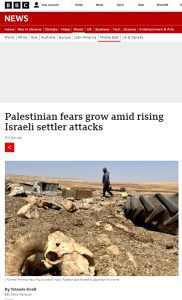
Earlier in the month both UN OCHA-oPt and the political NGO B’tselem had put out related press releases and several days before the appearance of Knell’s reports, other media outlets published a similar report by AP.
The theme of all Knell’s multi-platform reports is captured in this passage from her written item:
“Anti-occupation groups argue that as settlers have become emboldened by the current Israeli coalition government, settler attacks on Palestinians and their property have risen to a record high.”
Like the AP item, all Knell’s reports quote “the UN” – although the contributor concerned is actually a representative of the ‘UN Office for the Coordination of Humanitarian Affairs in the occupied Palestinian territory’ (UN OCHA-oPt) – without providing audiences with any information concerning that organisation’s record of anti-Israel activity and campaigning as required by BBC editorial guidelines on impartiality.
“The UN’s humanitarian agency (OCHA) says it has registered over 700 incidents this year where settler violence has resulted in Palestinian casualties, damage to property or both. The number is the highest since it began recording such acts in 2006.
“Just to give you an idea, in 2021 there was an average of one incident of settler violence a day that we were recording. In 2022, there were two incidents of settler violence and in 2023 we have an average of three incidents of settler violence a day,” says Andrea De Domenico, head of OCHA in the occupied Palestinian territory.
Mr de Domenico warns that Palestinian Bedouin and other herding communities in Area C are particularly vulnerable.
“We’re seeing more and more pressure on Palestinian communities to leave their land,” he tells me. “Recently there are three communities that have been completely removed.””
One of those communities – Al Qabun, which was the topic of the B’tselsm press release – is showcased in all of Knell’s reports and in the AP report.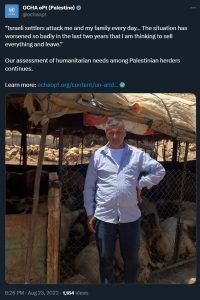
“At the start of August, the remaining families from al-Qabun, a herding community in the central West Bank, dismantled their homes and sheep pens to move to safer places. A total of 89 people were forced away, blaming Israeli demolition threats and settler intimidation.
“They used to stop outside our house at midnight and honk their car horns or send kids to harass us. They would scare the sheep and block them in, or empty out our water tank,” says Ammar Abu Alia.
He worries for the future as he squeezes more than 100 of his flock into a pen on land which he is only able to rent temporarily. “What will we do?” he asks. “We’ll be forced to sell. We’ll have no livelihood.”
Like the rest of her extended family, Nida Abu Alia – Ammar’s sister – is now living in cramped accommodation in a village close to the land they lived on for generations. The mother of nine is bitter about the relative lack of attention paid to her community’s plight.
“People said that this is Area C, but that’s not right. It’s the land of Palestine,” she says. “Our displacement is a great loss. People must realise what’s happening. If they don’t, we will lose a lot.”” [emphasis added]
Contrary to the narrative amplified by Knell, Al Qabun is located in Area C which, under the terms of the Oslo Accords, remains under Israeli administration pending final status negotiations. Those negotiations have of course yet to take place and in the meantime, Israel is solely responsible for planning and zoning in that area.
In an article that widely quotes another foreign funded political NGO that campaigns on the same topic – Kerem Navot – the Israeli media outlet ‘Sicha Mekomit’ reported that the twelve families who lived in Al Qabun had moved there in 1996. Yolande Knell however displays no interest in the question of their legal claim to the land upon which they settled after it had been categorised as Area C.
Knell tells her readers that:[emphasis added]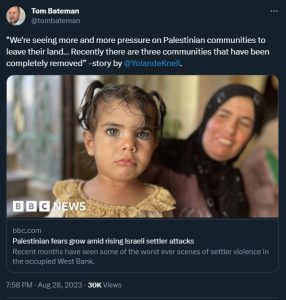
“Human rights groups warn that the forced transfer of Palestinians from their homes on occupied land could amount to a war crime by Israel, if it is proven that official steps amount to coercion.
At the same time, settlers and their supporters in the Israeli government are seeking to take advantage of the new political reality. Huge investment is planned to expand settlements and improve their infrastructure, cementing a Jewish presence in the West Bank and changing the landscape.
With their own leaders too weak to effect a serious change in course and a sense that settlers enjoy impunity, Palestinian anger and resentment is growing.
The ongoing developments only look set to deepen bitter hostilities.”
However, not for the first time Knell has nothing whatsoever to tell BBC audiences about an additional aspect of the story she purports to report: the “too weak” Palestinian Authority’s deliberate creation of ‘facts on the ground’ in Area C.
As recently noted by the INSS:
“The main objective of the PA is to prepare the conditions for taking over most of Area C. In this framework, it seeks to create contiguous settlement by Palestinians between districts; create a chokehold around Jewish settlements to prevent their expansion; and control main transport routes and direct access to the Kingdom of Jordan. It has therefore set up a government ministry to supervise activity in the area, map out Palestinian needs, and prepare plans.
In 2009, the PA began to formulate the Fayyad Plan, under then-PA Prime Minister Salam Fayyad, based on the conviction that a Palestinian state must be built from the bottom up. Subsequently the Campaign for Area C was formulated, designed to subject most of Area C to Palestinian sovereignty. The plan was funded by a foreign budget and also embodied in a European Union resolution that stated that the Palestinians can operate in Area C not only for humanitarian and economic reasons, but also to promote a political settlement and as a response to Israel’s expansion of settlements.
The Palestinian intention to take control of Area C includes registering Palestinian ownership of the land. According to a Ministry of Intelligence report, in recent years the Palestinian Authority has invested much effort in the registration of land, exploiting a legal vacuum that was created when Israel froze the process of land regulation in 1968 for legal reasons and to save resources. At the same time, the Palestinians are engaged in legal efforts to prevent the demolition of illegal construction (mainly public buildings) and have obtained authorization for 113 unauthorized villages. Following the Israeli disengagement from northern Samaria (2005), there was considerable growth in the scope of Palestinian construction in that region, and the area of land taken over has jumped by 150 percent. The PA’s actions in the area have European backing, and the Palestinians are operating with European funding to register the Palestinian land. In the background, it is clear that the Palestinian population is preparing to take control of Area C, as shown by the use of its agricultural and grazing land.”
Knell is able to report that:
“Already 2023 has set an all-time record for settlement construction in the West Bank and for the legitimisation of outposts, according to settlement watchdog Peace Now. Outposts are often set up with a wink and a nod from Israeli authorities but without official permission.”
Notably however, she has nothing at all to tell BBC audiences on the no less relevant topic of a different kind of “settlement construction in the West Bank”: the Palestinian Authority approved outposts in Area C which often include illegally constructed buildings and projects funded by the EU, despite that body’s status as a witness to the Oslo Accords.
Yolande Knell’s self-conscription to such political campaigns has long been evident (see ‘related articles’ below). The BBC is apparently unperturbed by the fact that her one-sided activist-journalism clearly does not serve the interests of BBC audiences seeking to understand the full background to events in Area C.
Related Articles:
BBC’S YOLANDE KNELL DITCHES CRITICAL JOURNALISM TO PROMOTE EU AND NGO CAMPAIGNS
BBC REPORTS ERASE FOREIGN FUNDING OF ILLEGAL STRUCTURES IN AREA C

